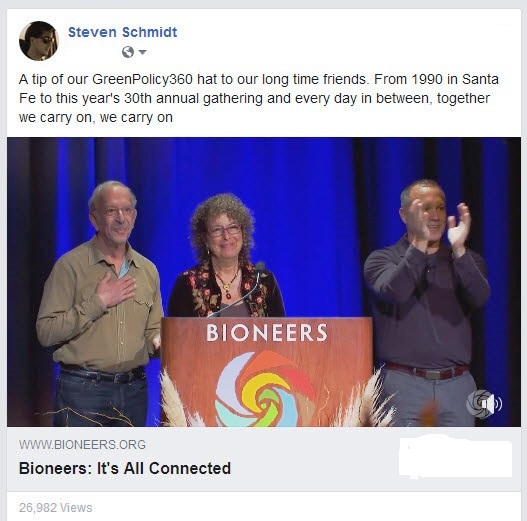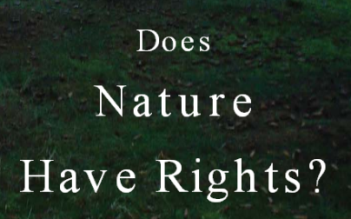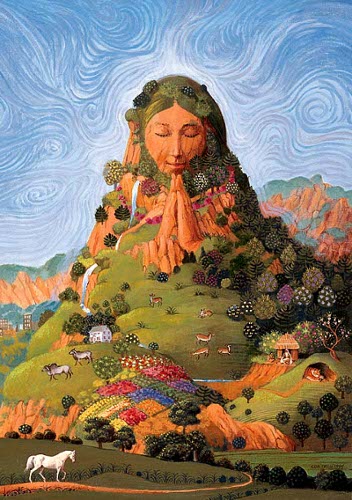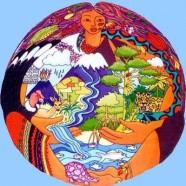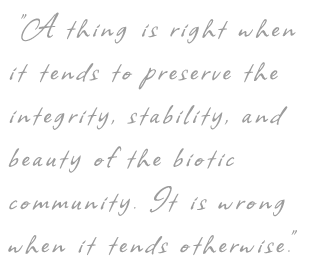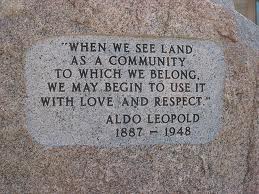Rights of Nature EarthLaw: Difference between revisions
Siterunner (talk | contribs) No edit summary |
Siterunner (talk | contribs) No edit summary |
||
| Line 12: | Line 12: | ||
* https://www.orlandoweekly.com/Blogs/archives/2019/09/11/movement-grows-in-florida-to-preserve-nature-and-drinking-water-by-granting-legal-rights-to-rivers | * https://www.orlandoweekly.com/Blogs/archives/2019/09/11/movement-grows-in-florida-to-preserve-nature-and-drinking-water-by-granting-legal-rights-to-rivers | ||
<big><big>Rights of Nature at the Bioneers</big></big> | |||
* http://www.bioneers.org | |||
* https://www.greenpolicy360.net/w/Bioneers | |||
''In deep contrast to the “human vs. nature” dichotomy underpinning much Western thought, Indigenous Peoples share a worldview that humans are a part of nature’s interconnected systems. It’s not surprising that Indigenous Peoples are at the forefront of a growing movement to acknowledge the legal “Rights of Nature.”'' | |||
[[File:Bioneers It's all connected - 30th annual conference.jpg|link=https://www.facebook.com/Bioneers.org/videos/2197871260292334/]] | |||
''Rights of Nature is a global movement to protect nature (rivers, mountains, and entire ecosystems and the life forms supported within them) by recognizing its legal rights. Just as humans and corporations are considered to “have rights,” this legal strategy grants rights to nature itself. These frameworks turn the existing property rights-based paradigm upside down and offer a powerful basis and strategy to conserve lands and communities. They also offer a radically different worldview: the right of nature to exist, persist, flourish and evolve.'' | |||
''Rights of Nature legal frameworks could hold important keys to shifting the system and transforming the law from treating nature as property to a rights-bearing entity on whose behalf people have legal standing as trustees. Bioneers is partnering with a variety of Native allies and organizations to explore these alternative legal strategies to “occupy the law.” '' | |||
'''''Visit the Bioneers Riights of Nature Action Initiative''''' | |||
* https://bioneers.org/projects/rights-of-nature-legal-frameworks-in-indian-country/ | |||
''As Paul Hawken once said at the [https://bioneers.org/tag/bioneers-conference/ annual Bioneers conference], “The more corporations are in control, the more the world goes out of control.” That is the dilemma we all face. As to how to address that crisis, there are many paths. Bioneers believes Rights of Nature legal frameworks could hold important keys to shifting the system and transforming the law from treating nature as property to a rights-bearing entity on whose behalf people have legal standing as trustees...'' | |||
''More at:'' | |||
The Center for Democratic and Environmental Rights -- https://www.centerforenvironmentalrights.org | |||
(FB) https://www.facebook.com/centerforenvironmentalrights/ | |||
(TW) https://twitter.com/rightsofnature | |||
············ | |||
Revision as of 16:34, 18 July 2020
2020
Seven Countries Recognize Rights of Nature
Rights of Nature: Moving to Protect Rivers and Water in Florida
Rights of Nature at the Bioneers
In deep contrast to the “human vs. nature” dichotomy underpinning much Western thought, Indigenous Peoples share a worldview that humans are a part of nature’s interconnected systems. It’s not surprising that Indigenous Peoples are at the forefront of a growing movement to acknowledge the legal “Rights of Nature.”
Rights of Nature is a global movement to protect nature (rivers, mountains, and entire ecosystems and the life forms supported within them) by recognizing its legal rights. Just as humans and corporations are considered to “have rights,” this legal strategy grants rights to nature itself. These frameworks turn the existing property rights-based paradigm upside down and offer a powerful basis and strategy to conserve lands and communities. They also offer a radically different worldview: the right of nature to exist, persist, flourish and evolve.
Rights of Nature legal frameworks could hold important keys to shifting the system and transforming the law from treating nature as property to a rights-bearing entity on whose behalf people have legal standing as trustees. Bioneers is partnering with a variety of Native allies and organizations to explore these alternative legal strategies to “occupy the law.”
Visit the Bioneers Riights of Nature Action Initiative
As Paul Hawken once said at the annual Bioneers conference, “The more corporations are in control, the more the world goes out of control.” That is the dilemma we all face. As to how to address that crisis, there are many paths. Bioneers believes Rights of Nature legal frameworks could hold important keys to shifting the system and transforming the law from treating nature as property to a rights-bearing entity on whose behalf people have legal standing as trustees...
More at:
The Center for Democratic and Environmental Rights -- https://www.centerforenvironmentalrights.org
(FB) https://www.facebook.com/centerforenvironmentalrights/ (TW) https://twitter.com/rightsofnature
············
2019
Rights of Nature: A Movement
Rights of Nature Constitutional Amendment Introduced in Swedish Parliament
2018
The Sami Parliament of Sweden endorses the Universal Declaration of Rights of Mother Earth
The Declaration includes the right of Mother Earth and her beings to life and existence, respect, to regenerate its biocapacity and to continue its vital cycles and processes free from human disruptions...
This is a very important decision, says Marie Persson Njajta. We wrote it for our children and the possibilities for coming generations to live a good life. We believe a paradigm shift is needed towards a view where humans understand ourselves as part of nature, which is the way indigenous people relate to nature. We, the Sami people, believe that we belong to the land, not the other way around.
The Declaration was first presented at the World People’s Conference on Climate Change in 2010.
With the enactment of the its 2008 Constitution, Ecuador became the first country in the world to codify the Rights of Nature. Articles 10 and 71–74 of the Ecuadorian Constitution recognize the inalienable rights of ecosystems to exist and flourish, gives people the authority to petition on the behalf of ecosystems, and requires the government to remedy violations of these rights.
"Ley de Derechos de La Madre Tierra"
Bolivia passes "Law of Mother Earth"
Public Law (Spanish - PDF)
October 19, 2014
The Law of Mother Earth ("Ley de Derechos de La Madre Tierra") holds the land as sacred and holds it as a living system with rights to be protected from exploitation. The law moves to create 11 distinguished rights for the environment. Bolivia's Plurinational Legislative Assembly passed the law in December 2010. The 10 article law derives from the first part of a longer bill, drafted and released by the 'Pact of Unity', November 2010.
In accordance with the philosophy of Pachamama, language in the law states the Earth "is sacred, fertile and the source of life that feeds and cares for all living beings in her womb. She is in permanent balance, harmony and communication with the cosmos. She is comprised of all ecosystems and living beings, and their self-organisation."
"It makes world history. Earth is the mother of all," said Vice-President Alvaro García Linera. "It establishes a new relationship between man and nature, the harmony of which must be preserved as a guarantee of its regeneration."
The law enumerates seven specific rights to which Mother Earth and her constituent life systems, including human communities, are entitled to:
- To life: It is the right to the maintenance of the integrity of life systems and natural processes which sustain them, as well as the capacities and conditions for their renewal
- To the Diversity of Life: It is the right to the preservation of the differentiation and variety of the beings that comprise Mother Earth, without being genetically altered, nor artificially modified in their structure, in such a manner that threatens their existence, functioning and future potential
- To water: It is the right of the preservation of the quality and composition of water to sustain life systems and their protection with regards to contamination, for renewal of the life of Mother Earth and all its components
- To clean air: It is the right of the preservation of the quality and composition of air to sustain life systems and their protection with regards to contamination, for renewal of the life of Mother Earth and all its components
- To equilibrium: It is the right to maintenance or restoration of the inter-relation, interdependence, ability to complement and functionality of the components of Mother Earth, in a balanced manner for the continuation of its cycles and the renewal of its vital processes
- To restoration: It is the right to the effective and opportune restoration of life systems affected by direct or indirect human activities
- To live free of contamination: It is the right for preservation of Mother Earth and any of its components with regards to toxic and radioactive waste generated by human activities.
○
LA PAZ, May 19 2014 (IPS) - The law for the defence of Mother Earth passed by Bolivia a year and a half ago has not yet moved from good intentions to concrete action.
The Framework Law on Mother Earth and Integral Development for Living Well, in effect since Oct. 15, 2012, outlines principles for making a shift from classic development models to an integral model “in harmony and balance with nature, recovering and strengthening local and ancestral knowledge and wisdom.”
The law enshrines the legal rights of nature, condemns the treatment of Mother Earth’s environmental functions as merchandise rather than gifts from nature, and requires efforts to prevent and avoid damage to the environment, biodiversity, human health and intangible cultural heritage.
Chapter four of the law establishes an institutional framework on climate change, centred around an office called the “plurinational authority for Mother Earth”.
The director of that unit, Benecio Quispe, was appointed on Feb. 18 and is still in the process of naming a team and setting up an office.
The first activity organised by Quispe’s office was the First National Workshop on Climate Change Policies targeting social, academic, public and private organisations and representatives of the different levels of government: central, departmental (provincial) and municipal...
http://dotearth.blogs.nytimes.com/2008/09/29/ecuador-constitution-grants-nature-rights/
http://www.huffingtonpost.com/robert-koehler/the-sacred-and-the-dead_b_855272.html
http://www.huffingtonpost.com/robert-koehler/walk-softly_b_4824030.html
http://www.theguardian.com/environment/2011/apr/10/bolivia-enshrines-natural-worlds-rights
http://www.gaiafoundation.org/earth-law-precedents
·······································································································
On Mother Earth Day 2013, UN Member States urge harmony with nature
·······································································································
News
The Nonhuman Rights Project - gaining common law rights for nonhuman animals through litigation
http://www.nonhumanrightsproject.org/
○
A River in New Zealand Gets a Legal Voice
More
Whanganui River given rights as a legal identity
"Ko au te awa, Ko te awa ko au ~ I am the river and the river is me"
New Zealand river legal rights via Treehugger
○
Flowing rivers must be a human right, Stockholm Water Prize
○
On the intersection of environment and faith, Dr. Mary Evelyn Tucker, co-director of the Yale Forum on Religion and Ecology, explains: “This encyclical, and its statement on the intrinsic rights of nature, is a breath of fresh air. Efforts to tackle climate change and other environmental issues have been driven by science, policy, economics, technology, and law. But science and policy alone are not going to solve these problems. We need these larger values–religion, art, and philosophy.”
○ ○ ○ ○
Rights of Nature
Legal advocacy by the Community Environmental Legal Defense Fund
The Community Environmental Legal Defense Fund works with communities in the United States and in countries around the world on grassroots organizing, public education and outreach, research, and legislative drafting - assisting people, NGOs, elected representatives, and government officials to craft and adopt new laws that change the status of natural communities and ecosystems from being regarded as property under the law to being recognized as rights-bearing entities.
Through this work, the Legal Defense Fund has assisted more than three dozen communities in the U.S., and assisted the Constituent Assembly of Ecuador, to put in place a new paradigm to protect nature - a paradigm based on rights.
○
○
#LandEthic - #RightsofNature - #EarthLaw
○
